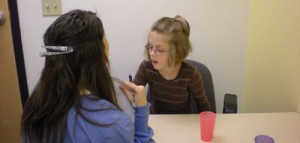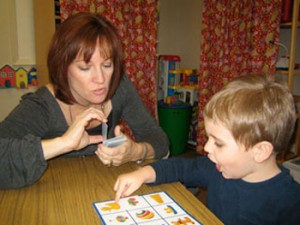Expressive language disorder (ELD) is a childhood condition that reportedly affects round 3-10% of all children of school-going age. Read to know more about the causes, symptoms, diagnosis and treatment of this disorder.
What is Expressive Language Disorder?
Page Contents
- 1 What is Expressive Language Disorder?
- 2 Types of Expressive Language Disorder
- 3 Demographics of Expressive Language Disorder
- 4 Expressive Language Disorder Causes
- 5 Expressive Language Disorder Symptoms
- 6 Expressive Language Disorder Diagnosis
- 7 Expressive Language Disorder Treatment
- 8 Expressive Language Disorder Prevention
It is a communication disorder that is generally observed in childhood. Children suffering from this condition face difficulties in verbal and written communication. They have limited vocabulary and are also unable to communicate well with other children.
This condition is also referred to as Expressive Language Impairment.
Types of Expressive Language Disorder
This disorder is of two types:
Picture 1 – Expressive Language Disorder
Developmental ELD
It appears during the growing stage of a child and is more common in boys than in girls.
Acquired ELD
It usually arises after a brain injury. It may develop at any age and is not limited to small children.
Demographics of Expressive Language Disorder
This disorder is more common in childhood. Medical research has proved the chances of occurrence of this disorder to be more in boys as compared to girls. 10-15% cases have been reported in children below 3 years of age and 3-7 % in children of school-going age. Another commonly observed trend with the disease is that the developmental type is more common than the acquired type.
Expressive Language Disorder Causes
The cause of Developmental ELD is still unknown. A lot of research is being done in this field to find out the biological and environmental factors associated with this particular type of the condition. Acquired ELD, on the other hand, has been found to be caused due to any process or conditions that damage the brain such as seizures or stroke. Research has also proved that in some cases the disorder arises due to a genetic impairment. This indicates that the condition can pass on from one generation to another. However, this is not true for all cases.
Expressive Language Disorder Symptoms
The symptoms of the disorder primarily depend on the age of the patient and tend to vary from one child to another. However, there are certain general symptoms associated with the condition. These include:
- Making more grammatical mistakes while writing or speaking. Affected children tend to leave out different parts of grammar or frame sentences with poor structures.
- Limited vocabulary as compared to that of a normal child. Sufferers simply use the same words again and again.
- Problems in remembering words, lessons or stories.
- Hesitation to start or even take part in a conversation.
- Inability to complete school assignments properly.
- Using gestures instead of words for expressing feelings, due to shortage of words or limited vocabulary.
Expressive Language Disorder Diagnosis
Professional speech therapists use various techniques to determine the communication skills, vocabulary, expression and other linguistic skills of a child. Proper diagnosis is extremely important for distinguishing this disease from other similar disorders, such as hearing problems. This is because if a child is not able to hear things clearly, he will not be able to follow the instructions provided. This is the reason why the hearing capabilities of a child should be evaluated first. Thereafter, non-verbal tests should be performed by providing written assignments to a child.
Picture 2 – Expressive Language Disorder Image
The tests used by speech therapists are specific in order to find out the exact problem areas for a child. As a parent, it is necessary for you to remain with your children during the entire consultation period.
Expressive Language Disorder Treatment
The treatment of this condition involves a number of methods. Some of the commonly employed curative techniques used by speech therapists involve:
- Speech pathology sessions, to improve communication skills
- Specific assignments regarding verbal and non-verbal communication
- Interactive games and study programs
The treatment of this disorder depends on number of factors, such as the age of the patient and intensity of the symptoms. The role of parents is also very important in the treatment and they should cooperate with therapists in employing different techniques for remedying the condition.
Expressive Language Disorder Prevention
The occurrence of acquired type disorder can be avoided with the aid of proper preventive measures. Since this disorder occurs by any process that damages the brain, all possible precautionary measures should be taken. For instance, you can wear a helmet while driving a bike to prevent any brain injury in case of an accident. Similarly, you can improve your eating habits to eliminate the chances of a stroke.
If you find your child having difficulties while speaking or communicating with others, get his/her language skills evaluated by a speech therapist. It is imperative for you not be late in reporting the disorder as it can deprive your child of the appropriate treatment option that can be crucial for his/her health and future.
References:
http://en.wikipedia.org/wiki/Expressive_language_disorder
http://www.betterhealth.vic.gov.au/bhcv2/bhcarticles.nsf/pages/Expressive_language_disorder
http://www.minddisorders.com/Del-Fi/Expressive-language-disorder.html
http://psychcentral.com/disorders/sx41.htm
http://www.nationwidechildrens.org/mixed-receptive-expressive-language-disorder


